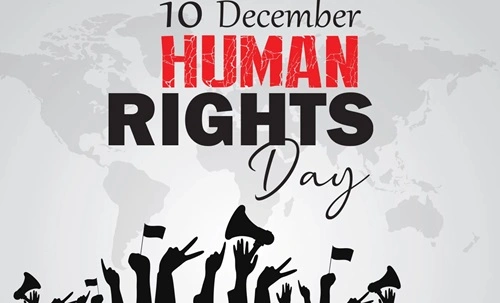Human Rights Day, observed annually on December 10, is a global occasion dedicated to promoting awareness of human rights and recognizing the importance of dignity, equality, and freedom for all individuals. This day marks the anniversary of the adoption of the Universal Declaration of Human Rights (UDHR) by the United Nations General Assembly in 1948, a landmark document that outlines the fundamental rights and freedoms every person is entitled to, regardless of race, gender, nationality, or religion.
Here’s everything you need to know about Human Rights Day, its history, significance, and the global efforts it inspires.
The History of Human Rights Day

The roots of Human Rights Day lie in the aftermath of World War II, when the global community recognized the need to safeguard human dignity and prevent atrocities. On December 10, 1948, the United Nations General Assembly adopted the Universal Declaration of Human Rights, a groundbreaking document that enshrines the rights and freedoms of every individual.
The declaration, drafted by representatives from diverse cultural and legal traditions, consists of 30 articles outlining civil, political, economic, social, and cultural rights. It has since become a cornerstone of international human rights law and inspired numerous treaties, constitutions, and legal frameworks worldwide.
In 1950, the General Assembly proclaimed December 10 as Human Rights Day through Resolution 423 (V), calling on all nations and organizations to commemorate the day and promote the principles of the UDHR.
Significance of Human Rights Day
Human Rights Day serves multiple purposes:
- Promoting Awareness: It highlights the importance of human rights and educates people about their rights and responsibilities.
- Inspiring Action: The day encourages individuals, governments, and organizations to take action to address human rights violations.
- Fostering Unity: It underscores the universality of human rights, reminding us that these rights belong to everyone, everywhere.
- Advancing Equality: The day amplifies calls for the protection of marginalized groups and the elimination of discrimination.
Themes of Human Rights Day
Each year, Human Rights Day adopts a specific theme to address pressing global challenges and focus on key aspects of human rights. Recent themes include:
- 2023: “Dignity, Freedom, and Justice for All” – Reaffirming the principles of the UDHR as the foundation for human rights.
- 2022: “Equal Opportunities in a Post-COVID World” – Addressing inequalities exacerbated by the pandemic.
- 2021: “Reducing Inequalities, Advancing Human Rights” – Highlighting the connection between equality and human rights.
These themes guide global discussions, campaigns, and initiatives, fostering a deeper understanding of human rights issues.
Human Rights in Practice
Human rights are the foundation of freedom, justice, and peace. They encompass a broad range of entitlements, including:
- Civil and Political Rights:
- Freedom of speech, religion, and assembly.
- The right to a fair trial and protection from torture or arbitrary detention.
- Economic, Social, and Cultural Rights:
- Access to education, healthcare, and decent work.
- The right to participate in cultural life and enjoy social protections.
- Collective Rights:
- Rights to self-determination, development, and environmental protection.
While the UDHR lays out these rights, their implementation varies globally, often hindered by conflicts, political instability, discrimination, and inequality.
Challenges in Advancing Human Rights
Despite significant progress, several challenges persist in the fight for universal human rights:
- Discrimination: Marginalized groups, including women, minorities, and people with disabilities, often face systemic barriers.
- Conflict and Displacement: Wars and crises displace millions, depriving them of basic rights like safety, education, and healthcare.
- Freedom of Expression: Journalists and activists continue to face threats, censorship, and persecution in many countries.
- Economic Inequality: Widening disparities in wealth and opportunity hinder access to fundamental rights for many.
- Climate Change: Environmental degradation disproportionately impacts vulnerable populations, challenging their right to a sustainable future.
Addressing these challenges requires global solidarity, robust legal frameworks, and active participation from all sectors of society.
How Human Rights Day is Observed
Human Rights Day is marked by events and activities worldwide to promote awareness and inspire action:
- Educational Campaigns: Schools, universities, and organizations host discussions, workshops, and seminars on human rights.
- Advocacy Events: Civil society groups and NGOs organize rallies, petitions, and social media campaigns to highlight rights issues.
- Awards and Recognitions: The United Nations Prize in the Field of Human Rights and other awards are presented to individuals and organizations making significant contributions to human rights.
- Cultural Programs: Art exhibits, music concerts, and theater performances focus on human rights themes, engaging audiences creatively.
Global Efforts to Uphold Human Rights
Numerous organizations and initiatives work to protect and promote human rights globally:
- Office of the High Commissioner for Human Rights (OHCHR): The OHCHR oversees international human rights efforts, offering expertise, monitoring violations, and advocating for victims.
- Human Rights Council: This intergovernmental body addresses violations and makes recommendations to improve human rights worldwide.
- Amnesty International: A leading NGO that campaigns against human rights abuses and supports victims globally.
- Human Rights Watch: This organization conducts research and advocacy to expose and address violations.
How You Can Support Human Rights
Everyone has a role to play in advancing human rights. Here are some ways to contribute:
- Educate Yourself: Learn about your rights and the challenges others face globally.
- Speak Out: Use your voice to advocate for justice, equality, and freedom.
- Support Organizations: Volunteer with or donate to groups that work to protect human rights.
- Challenge Discrimination: Stand against prejudice and promote inclusivity in your community.
- Raise Awareness: Share information and campaigns on social media to amplify the message of human rights.
Looking Ahead: A Future of Dignity and Justice
As the Universal Declaration of Human Rights approaches its 75th anniversary, the global community has an opportunity to reflect on its achievements and address ongoing challenges. The principles of dignity, freedom, and equality remain as relevant today as they were in 1948, serving as a guide for building more just and inclusive societies.
Conclusion
Human Rights Day is a powerful reminder of the enduring importance of protecting and promoting the rights and freedoms of all individuals. By commemorating this day, we reaffirm our commitment to upholding the principles of the Universal Declaration of Human Rights and ensuring that every person lives with dignity, equality, and justice. Let us take this opportunity to stand united in the fight for human rights, leaving no one behind.

